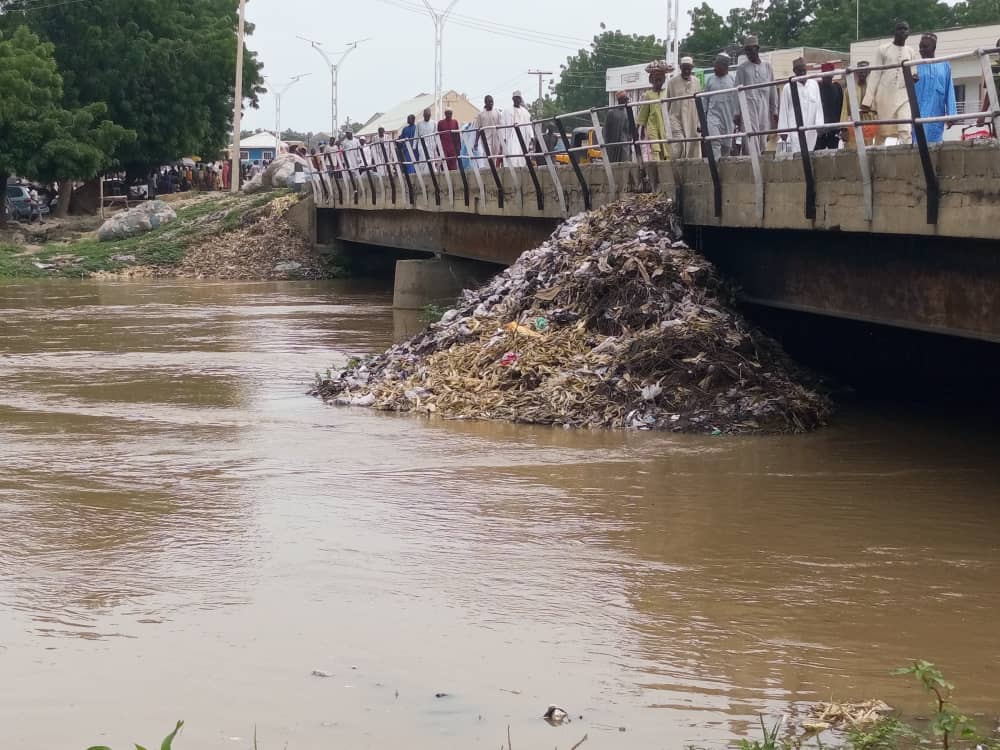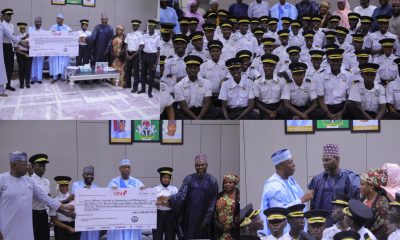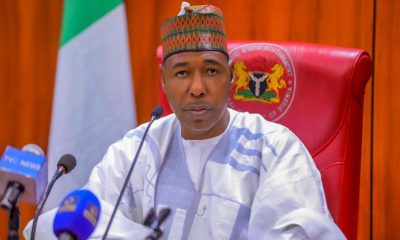National
Waste Dump Chokes River Ngada in Maiduguri, Raising Fears of Flooding, Disease

By Adamu Aliyu Ngulde, Maiduguri
MAIDUGURI, Nigeria — At the edge of Gwange, one of Maiduguri’s oldest neighborhoods, a foul smell rises from River Ngada. The once free-flowing waterway is now a stagnant pool clogged with heaps of refuse — plastic bags, discarded food, household waste and even broken furniture.
As the rainy season sets in, residents are sounding the alarm. They fear the blocked river could trigger flooding, a disaster that has become familiar in the Borno State capital.
“This river is supposed to carry water away, but it has turned into a dumping ground,” said Musa Abdullahi, who has lived along the riverbank for more than two decades. “When the rains come, the water cannot flow, and it floods our houses.”
A Growing Environmental Threat
River Ngada cuts across several Maiduguri neighborhoods, connecting to smaller waterways that should ease the city’s drainage burden. Instead, it has become a receptacle for indiscriminate dumping, with traders and households disposing of refuse directly into the water.
Environmental experts say the obstruction is dangerous. Stagnant water not only heightens the risk of cholera, typhoid and malaria outbreaks but also increases the likelihood of flash floods. Last year, floods displaced hundreds of families across Maiduguri, destroying homes, food stocks and property.
“The problem is not just the rain, but the way we manage our environment,” said Abubakar Ali, a geographer at the University of Maiduguri. “When you block natural waterways with refuse, you are creating a flood disaster waiting to happen.”
Strained Waste Management
Residents say the problem has worsened in recent years as Maiduguri’s population swells with people displaced by conflict and insecurity in rural areas. The city’s fragile waste management system has struggled to cope with the rising volume of trash.
Waste collection trucks often fail to reach inner neighborhoods, leaving residents with little choice but to dump garbage in nearby rivers and drains. For many, River Ngada has become the easiest disposal site.
“The trucks don’t come here regularly,” said Halima Usman, a mother of five in Hausari. “If you keep the waste at home, it smells and attracts flies. People just carry it and throw it in the river.”
Official Response
The Borno State Environmental Protection Agency (BOSEPA) admits the challenge is severe. The agency conducts periodic clearance exercises, but the scale of the problem quickly overwhelms their efforts.
“Government cannot do it alone,” said a BOSEPA General Manager in an interview. “We need residents to change their attitude toward waste disposal. If people continue to dump refuse into River Ngada, no matter how many times we clear it, the problem will return.”
BOSEPA has launched community sensitization campaigns, urging households to use designated disposal points and promising stricter enforcement against illegal dumping. Officials also say they are exploring partnerships with private waste contractors to strengthen collection services.
Climate Change and Urban Risks
Meteorological agencies have warned that Maiduguri and other northeastern cities may experience higher-than-average rainfall this year. Combined with blocked drainage systems and unplanned urban expansion, the risk of destructive floods looms large.
According to the Nigerian Meteorological Agency (NiMet), rainfall in Maiduguri in 2022 was about 43 percent higher than the long-term average. Experts link this variability to climate change, which is making rainfall more unpredictable and intense.
“When you have extreme weather events in a city with weak infrastructure, the impact is devastating,” said Ali, the University of Maiduguri geographer. “Clearing River Ngada and improving waste management are not optional — they are urgent.”
A City on Edge
For families along River Ngada, the danger feels personal. Many still remember last year’s flood, when water rushed into their homes in the middle of the night. Some households lost food stocks and furniture; others lost shelter entirely.
“We cannot sleep well when it rains,” Abdullahi said, standing near the heap of garbage blocking the river. “We are always afraid it will happen again.”
As the rains intensify, Maiduguri’s residents are hoping that authorities move quickly to clear River Ngada before it becomes the next disaster zone. But many also admit that change must come from within the community.
“If we continue to treat the river as a dustbin, it will punish us,” Usman said. “The flood will not choose who is guilty or innocent. It will carry everyone.”













